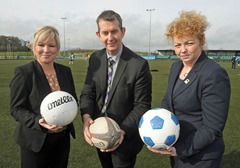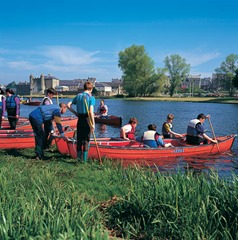Raising participation
 More people are taking part in sport but several targets in the Northern Ireland sport strategy are falling behind schedule. Peter Cheney analyses Sport Matters.
More people are taking part in sport but several targets in the Northern Ireland sport strategy are falling behind schedule. Peter Cheney analyses Sport Matters.
Sport Matters is Northern Ireland’s sport and physical recreation strategy and covers a 10-year timeframe: 2009-2019. The consultation for the strategy had closed in January 2008. It was approved by the Executive on December 2009 and published in May 2010 by then Culture, Arts and Leisure Minister Nelson McCausland.
The Department of Culture, Arts and Leisure (DCAL) had submitted its proposed final version to the Executive in 2008. At the time, ministers were still considering their policy on major stadiums. A DCAL spokeswoman said: “Executive approval could not be obtained until this process was completed.”
The strategy aims to create “a culture of lifelong enjoyment and success in sport” in the province. Twenty-six major targets are set out and an official progress report states that six of these had been met by 30 September 2012:
• conducting the Sport and Physical Activity Survey;
• a review of the economic impact of sport and physical recreation;
• providing spaces for 100 athletes per annum at the Sports Institute in Jordanstown;
• winning at least five medals at the 2010 Commonwealth Games (10 were won);
• starting a certification process to improve the safety and fabric of major stadiums; and
• establishing a minimum of 10 new or upgraded facilities to support players and athletes in Olympic and Paralympic sports (20 similar investments have been made to date).
Twenty-nine of the 30 designated stadiums had received safety certificates. Stadiums with safety certificates comply with the Safety of Sports Grounds (Northern Ireland) Order, signed in February 2006, but the process only started in December 2009.
The department said that further Assembly legislation was needed to put the original law into practice.
Sixteen targets are “on track for achievement” and are therefore expected to be delivered on time. These include stopping the decline in adult participation in sport and physical recreation, increasing the number of people with a sports club membership, and increasing participation rates for women, older people, disabled people and those living on low incomes.
A considerable improvement in the number of people taking weekly physical exercise has been recorded: up from 31 per cent to 41 per cent in three years. Participation among disabled people doubled between 2008 and 2011, with clear benefits for their health. That said, participation in low income groups appears to have remained constant. Seven out of 10 people in deprived areas are not taking regular exercise.
 Another four targets are described as “on track for achievement but with some delay or uncertainty”.
Another four targets are described as “on track for achievement but with some delay or uncertainty”.
This implies that the targets may be achieved by 2019 but will fall short of their deadlines. These are as follows:
• ensuring (by 2011) that all Sport Northern Ireland-funded governing bodies are ‘fit for purpose’ organisations;
• establishing (by 2011) a baseline for the number of children receiving at least two hours of quality physical education per week;
• providing (by 2014) every child aged eight years and over with the opportunity to participate in at least two hours per week of extra-curricular sport and physical recreation; and
• developing (by 2014) major sports stadiums for football, GAA and rugby on an “operationally viable and commercially sustainable” basis.
Sport Northern Ireland funds 32 governing bodies. A governance and management audit in 2011-2012 found that 24 out of these were operating at a “satisfactory” level but only five had a “substantial” level of compliance.
A separate child protection audit reported that 22 of the 32 governing bodies had “satisfactory” procedures with the remaining 10 classed as “limited”.
Statistics for the number of children receiving two hours of PE or extra-curricular sport do not exist.
The Department of Education recommends a minimum of two hours per week and it is conducting an inspection process to see if this guidance is being carried out.
The three major stadium refurbishments are at different stages and none will be ready by the target of January 2014.
Construction is under way on the Ravenhill project and it is due to be completed in September 2014. The Windsor Park upgrade is due for completion in June 2015 with the Casement Park project expected to follow by September 2015.
The IFA is also working with Sport-Northern Ireland on a ‘sub-regional facilities programme’ which will provide “significant capital investment” after the next spending review.
However, in practice, this means that no construction work in the area will be carried out until 2015 at the earliest.
For its part, the department is pleased that the strategy has secured a “widespread” recognition of the “value and importance of sport both [intrinsically] and in terms of its potential to contribute to broader government objectives and priorities.”
Party views
The Sport Matters strategy was approved by a DUP Minister and is being implemented by a Sinn Féin Minister. Both parties are satisfied with its content.
Former Culture, Arts and Leisure Minister Michael McGimpsey is now the UUP’s spokesman on sport. He believes that participation in sport, especially among young people, is “absolutely key to this strategy.” DCAL’s budget, he says, should focus on maximising the legacy of London 2012.
His SDLP counterpart, Karen McKevitt, has pointed out that “without facilities little else can be achieved,” particularly in rural areas. Alliance Party sports spokesman Chris Lyttle sees sport as “a great tool to unite the whole community” and has praised the IFA and GAA for their community relations work.





